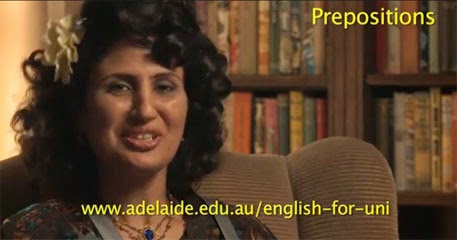I'd always thought tenses were fairly easy to learn in English, because the other languages I'd studied were all western European and had tense systems that weren't too far removed from English. Then I started working with students whose first language was Indonesian or Chinese and I realised that not all languages work the same way as French, Spanish or German. In fact, they may not have changing verb endings at all. That makes English tenses really difficult for speakers of many other languages.
We introduce our English for Uni video 'You've Got Talent' with an opening scene in which an Indonesian student
is asking for help with English verb tenses because she is writing an essay about talent contests. By chance, both she and Ms Parrot had attended a talent contest the week before. We then have a flashback to the talent contest, followed by an explanation of the use of different tenses in English academic writing.
You'll notice that one tense I've used twice in the paragraphs above is the past perfect: I'd thought, I'd studied. This is a tense that's really hard to use and to explain. I would describe it as an action that happens before another action in the past. However, everything in the past happens before another action in the past!
That's where the idea of aspect is useful. Celce-Murcia and Larsen-Freeman, in The Grammar Book, divide the conventional twelve tenses in English into combinations of tense and aspect, and suggest four different aspects in English: simple, continuous/progressive, perfect and perfect continuous/progressive. That means we can have present, past and future simple (e.g. I work, I worked, I will work); present, past and future perfect (e.g. I have worked, I had worked, I will have worked); present, past and future continuous/progressive (e.g. I am working, I was working, I will be working); and present, past and future perfect continuous/progressive (e.g. I have been working, I had been working, I will have been working).
Aspect describes how we see an action, whereas tense relates to the time the action occurrs. The perfect aspect means that a verb using this aspect is connected to another point in time. e.g. I had thought tenses were easy . . . until I knew more about them. In this case, I am looking back from one point in the past to a point further back in the past.
We have put a bit more information on this on the English for Uni website in the section called 'Aspect - for advanced grammar lovers'.
If these ideas make you feel more tense, watching the You've Got Talent competition will help you to relax!
Reference:
Celce-Murcia, M & Larsen-Freeman, D 1999, The grammar book (2nd edn), Heinle Cengage Learning, Boston, MA.
We introduce our English for Uni video 'You've Got Talent' with an opening scene in which an Indonesian student
is asking for help with English verb tenses because she is writing an essay about talent contests. By chance, both she and Ms Parrot had attended a talent contest the week before. We then have a flashback to the talent contest, followed by an explanation of the use of different tenses in English academic writing.
You'll notice that one tense I've used twice in the paragraphs above is the past perfect: I'd thought, I'd studied. This is a tense that's really hard to use and to explain. I would describe it as an action that happens before another action in the past. However, everything in the past happens before another action in the past!
That's where the idea of aspect is useful. Celce-Murcia and Larsen-Freeman, in The Grammar Book, divide the conventional twelve tenses in English into combinations of tense and aspect, and suggest four different aspects in English: simple, continuous/progressive, perfect and perfect continuous/progressive. That means we can have present, past and future simple (e.g. I work, I worked, I will work); present, past and future perfect (e.g. I have worked, I had worked, I will have worked); present, past and future continuous/progressive (e.g. I am working, I was working, I will be working); and present, past and future perfect continuous/progressive (e.g. I have been working, I had been working, I will have been working).
Aspect describes how we see an action, whereas tense relates to the time the action occurrs. The perfect aspect means that a verb using this aspect is connected to another point in time. e.g. I had thought tenses were easy . . . until I knew more about them. In this case, I am looking back from one point in the past to a point further back in the past.
We have put a bit more information on this on the English for Uni website in the section called 'Aspect - for advanced grammar lovers'.
If these ideas make you feel more tense, watching the You've Got Talent competition will help you to relax!
Reference:
Celce-Murcia, M & Larsen-Freeman, D 1999, The grammar book (2nd edn), Heinle Cengage Learning, Boston, MA.
























